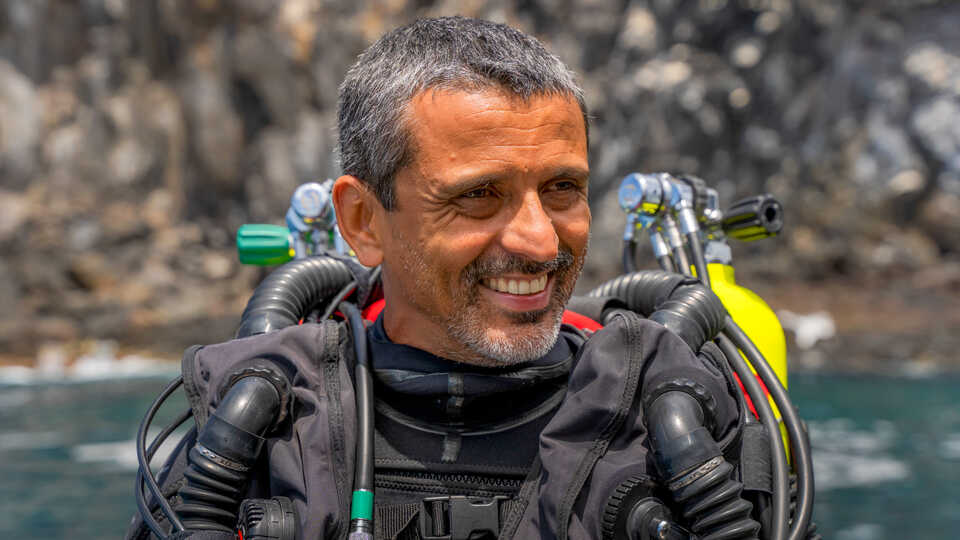Prestigious fellowship recognizes extraordinary achievements in the academic and social advancement of science

SAN FRANCISCO, CA (January 31, 2023) — Academy Curator of Ichthyology and co-Director of Hope for Reefs Luiz Rocha, PhD, has been elected as a 2022 Fellow of the American Association for the Advancement of Science (AAAS), an honor bestowed upon AAAS members by their peers. Rocha receives the honor for his many contributions to the field of marine biology that have enriched our understanding of coral reef ecosystems, among the most biodiverse places on Earth. He is particularly recognized for his discoveries made in mesophotic—or “twilight zone”—reefs, deep coral ecosystems that require specialized diving equipment and techniques to study.
“I’m honored to be elected as an AAAS Fellow,” Rocha says. “But I’m perhaps even more excited to see mesophotic coral ecosystems spotlighted in this way. Over two-thirds of known coral reefs are at mesophotic depths between 100 to 500 feet beneath the ocean’s surface. Yet these vibrant ecosystems remain relatively unknown, so it’s great to be able to draw attention to them through this recognition.”
Since 2002, Rocha has dived to the twilight zone around 1,500 times, discovering over 20 new-to-science species along the way, including iconic fishes such as the rose-veiled fairy wrasse and Aphrodite anthias. His collaborative research, conducted as part of the Academy’s Hope for Reefs initiative which aims to halt the decline of Earth’s coral reefs by the end of this decade, has also revealed important insights into the unique biodiversity of these deeper reefs and their vulnerability in the face of threats such as climate change and pollution.
“Luiz’s seminal work on mesophotic coral ecosystems has been—and continues to be—a pivotal part of the Academy’s mission to regenerate the natural world,” says Academy Executive Director Scott Sampson, PhD. “Needless to say all of us here at the Academy are thrilled, but not the least bit surprised, to see him recognized as an AAAS Fellow.”
“We are deeply proud of Luiz for receiving this honor,” adds Academy Chief of Science Shannon Bennett, PhD. “He is not only a great scientist but also a wonderful colleague, dedicated mentor, and skillful science communicator, all of which help him critically advance both scientific knowledge and public awareness of our planet’s reefs.”
“AAAS is proud to elevate these standout individuals and recognize the many ways in which they’ve advanced scientific excellence, tackled complex societal challenges and pushed boundaries that will reap benefits for years to come,” said Sudip S. Parikh, PhD, AAAS chief executive officer and executive publisher of the Science family of journals in a statement.
Rocha, along with the other fellows elected this year, will be celebrated this summer at the AAAS’s Annual Meeting in Washington, D.C.
The California Academy of Sciences is a renowned scientific and educational institution with a mission to regenerate the natural world through science, learning, and collaboration. Based in San Francisco’s Golden Gate Park, it is home to a world-class aquarium, planetarium, and natural history museum, as well as innovative programs in scientific research and environmental education—all under one living roof. Museum hours are 9:30 am – 5:00 pm Monday – Saturday, and 11:00 am – 5:00 pm on Sunday. Admission includes all exhibits, programs, and shows. For daily ticket prices, please visit www.calacademy.org or call (415) 379-8000 for more information.
The Institute for Biodiversity Science and Sustainability at the California Academy of Sciences is at the forefront of efforts to regenerate the natural world through science, learning, and collaboration. Based in San Francisco, the Institute is home to more than 100 world-class scientists, state-of-the-art facilities, and nearly 46 million scientific specimens from around the world. The Institute also leverages the expertise and efforts of more than 100 international Associates and 450 distinguished Fellows. Through expeditions around the globe, investigations in the lab, and analysis of vast biological datasets, the Institute’s scientists work to understand the evolution and interconnectedness of organisms and ecosystems, the threats they face around the world, and the most effective strategies for ensuring they thrive into the future. Through deeply collaborative partnerships and innovative public engagement initiatives, they also guide critical conservation decisions worldwide, inspire and mentor the next generation of scientists, and foster responsible stewardship of our planet.
Press Contacts
If you are a journalist and would like to receive Academy press releases please contact press@calacademy.org.
Digital Assets
Hi-res and low-res image downloads are available for editorial use. Contact us at press@calacademy.org to request access.